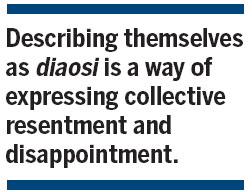Like other languages, Mandarin has a long evolutionary history during which it takes on new words. In the past year or so, diaosi, a Chinese Internet term, arrived on the scene. Diao refers a man's sex organ and si means hair.
Of course, diaosi is a coarse, informal term. Originally it referred to the down-at-heel, those who are unattractive physically and lack social privileges or resources.
Diaosi can be from all corners of the country. Generally they are from the countryside or from the urban petty bourgeois. Some are science graduates who have found that despite the time and money put into obtaining a degree, the rewards are scant.
They may be poor people, farm workers, small-handicrafts makers, industrial workers, disgruntled employees and distressed graduates or undergraduates. They may simply be lazy and like to present themselves as self-employed.
Thanks to the Internet, more young Chinese now quite like the idea of self-mockery and call themselves diaosi, which has helped the term take off.
The word caters to a desire by millions to express their repressed feelings about life and its pressures. As a result, more young people are attaching the word to themselves, even though they are nowhere near as underprivileged as the original term was meant to suggest.
Basically, diaosi have the following common characteristics:
First, it is a reflection of the anxiety and resentment of many youths who fret that social hierarchy is generally formed by family power, and that it will not change easily. Second-generation wealthy youths enjoy easy and prosperous lives, while ordinary folks struggle for limited resources.
Describing themselves as diaosi is a way of expressing collective resentment and disappointment.
Second, diaosi reflects that youths take themselves less seriously. In claiming to be diaosi, these people are affirming the hard work it takes to achieve personal progress. Their cynical outlook on life helps to release disappointment and cheers them up.

Third, diaosi often long after an idyllic soul mate. The problem is that the person they want to hook up with would be anything but attracted to them, leading to sexual frustration, loneliness and depression.
Fourth, diaosi always toil away in hard, exhausting and gloomy jobs. But they are usually at the middle of the social stratum and never the lowest. Their pay is not as meager as they claim, and in fact roughly equates with their abilities and talents. It's just that they feel they deserve a better job and are undervalued at work.
Many young people attach the word to themselves even though they are not nearly as hard up as the original diaosi. In that sense, diaosi are much like Ah Q, a character created by Lu Xun (a celebrated Chinese writer) in a novel.
Ah Q is a rural peasant with little education and no fixed job and famous for "spiritual victories", Lu Xun's euphemism for self-deception even when faced with extreme defeat or humiliation.
Ah Q is a bully to the less fortunate but fearful of those who are above him in rank, strength or power. He convinces himself that he is spiritually superior to his oppressors even as he succumbs to their tyranny and suppression.
Lu Xun exposes Ah Q's extreme faults as symptomatic of the Chinese national character of his time, the 1920s. The ending of the story - when Ah Q is carted off to be executed for a minor crime - is equally poignant and satirical.
The domain of the diaosi has never been a purely Chinese one. Japan has its otaku boys, Internet addicts who stay at home playing computer games, and "inertia girls", who lack the energy or motivation to face life. In American culture, "loser" is a serious word that refers to those who lack work and life skills.
And just as the word diaosi has become popular in China, there are youths in the US for whom being called a loser has lost its sting. In one song, Beck, a rock star representing the consumer generation, says, "I'm a loser, baby, so why don't you kill me?"
The writer teaches Chinese at Peking University.
Contact him at weibaoliang@pku.edu.cn.
China Daily
By Wei Baoliang (China Daily)
